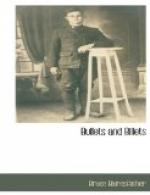CHAPTER VI
The transport farm—fleeced
by the
Flemish—riding—nearing
Christmas
It was about 9 p.m. when we turned into the courtyard of the farm. My sergeant saw to the unlimbering, and dismissed the section, whilst I went into the farm and dismantled myself of all my tackle, such as revolver, field-glass, greatcoat, haversacks, etc.
My servant had, of course, preceded me, and by the time I had made a partial attempt at cleaning myself, he had brought in a meal of sorts and laid it on the oilcloth-covered table by the stove. I was now joined by the transport officer and the regimental quartermaster. They lived at this farm permanently, and only came to the trenches on occasional excursions. They had both had a go at the nasty part of warfare though, before this, so although consumed with a sneaking envy, I was full of respect for them.
We three had a very merry and genial time together. We now had something distinctly resembling a breakfast, a lunch, and a dinner, each day. The transport officer took a lively interest in the efforts of Messrs. Fortnum and Mason, and thus added generously to our menus. It was a glorious feeling, pushing open the door of that farm and coming in from all the wet, darkness, mud and weariness of four days in the trenches. After the supper, I disappeared into the back kitchen place and did what was possible in the shaving and washing line. The Belgian family were all herded away in here, as their front rooms were now our exclusive property. I have never quite made out what the family consisted of, but, approximately, I should think, mother and father and ten children. I am pretty certain about the children, as about half a platoon stood around me whilst shaving, and solemnly watched me with dull brown Flemish eyes. The father kept in the background, resting, I fancy, from his usual day’s work of hiding unattractive turnips in enormous numbers, under mounds of mud—(the only form of farming industry which came under my notice in Flanders).
The mother, however, was “all there,” in more senses than one. She was of about observation balloon proportions, and had an unerring eye for the main chance. Her telegraphic address, I should imagine, was “Fleecem.” She had one sound commercial idea, i.e., “charge as much as you can for everything they want, hide everything they do want, and slowly collect any property, in the way of food, they have in the cellar; so that, in the future, there shall be no lack of bully and jam in our farm, at any rate.”
They had one farm labourer, a kind of epileptic who, I found out, gave his services in return for being fed—no pay. He will regret this contract of his in time, as the food in question was bully beef and plum and apple jam, with an occasional change to Maconochie and apple and plum jam. That store in the cellar absolutely precludes him from any change from this diet for many years to come. Of course, I must say his work was not such as would be classed amongst the skilled or intellectual trades; it was, apparently, to pump all the accumulated drainage from a subterranean vault out into the yard in front, about twice a week, the rest of his time being taken up by assisting at the hiding of the turnips.




